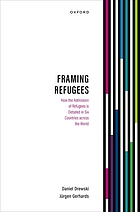
| Judul | Framing Refugee How the Admission of Refugees is Debated in Six Countries across the World / By Daniel Drewski, Jürgen Gerhards, |
| Pengarang | Drewski, Daniel Gerhards, Jürgen |
| Penerbitan | Oxford : Oxford University Press, 2024 |
| Deskripsi Fisik | 321 p. :ill. |
| ISBN | 9780198904724 |
| Subjek | EMIGRATION AND IMMIGRATION LAW |
| Catatan | Across the world, the number of people forcibly displaced from their homes has more than doubled during the last decade. Although international law does not allow states to turn back refugees, some countries close their borders to refugees, some open their borders and grant extensive protection, while others admit some groups of refugees while excluding others. How can we make sense of these different responses to admitting refugees? In this book, Daniel Drewski and Jürgen Gerhards show that governments' refugee policy, as well as the stance adopted by opposition parties on the issue, is heavily dependent on how they frame their country's collective identity on the one hand and the identity and characteristics of the refugees on the other. By defining the 'we' and the 'others', politicians draw on collectively shared cultural repertoires, which vary by country and by political constituency within a country. The book is based on a discourse analysis of parliamentary debates. It explores the specific framing of |
| Bentuk Karya | Tidak ada kode yang sesuai |
| Target Pembaca | Tidak ada kode yang sesuai |
| Lokasi Akses Online |
https://oer.unair.ac.id/files/original/30f30cf8c251be42151088a54f52a626.pdf https://library.oapen.org/handle/20.500.12657/92543 |
| No Barcode | No. Panggil | Akses | Lokasi | Ketersediaan |
|---|---|---|---|---|
| 351525192 | Baca Online | Perpustakaan Pusat - Online Resources Ebook |
Tersedia |
| Tag | Ind1 | Ind2 | Isi |
| 001 | INLIS000000000160182 | ||
| 005 | 20250409105239 | ||
| 007 | ta | ||
| 008 | 250409################|##########|#|## | ||
| 020 | # | # | $a 9780198904724 |
| 035 | # | # | $a 0010-0425000114 |
| 100 | 0 | # | $a Drewski, Daniel |
| 245 | 1 | # | $a Framing Refugee How the Admission of Refugees is Debated in Six Countries across the World /$c By Daniel Drewski, Jürgen Gerhards, |
| 260 | # | # | $a Oxford :$b Oxford University Press,$c 2024 |
| 300 | # | # | $a 321 p. : $b ill. |
| 505 | # | # | $a Across the world, the number of people forcibly displaced from their homes has more than doubled during the last decade. Although international law does not allow states to turn back refugees, some countries close their borders to refugees, some open their borders and grant extensive protection, while others admit some groups of refugees while excluding others. How can we make sense of these different responses to admitting refugees? In this book, Daniel Drewski and Jürgen Gerhards show that governments' refugee policy, as well as the stance adopted by opposition parties on the issue, is heavily dependent on how they frame their country's collective identity on the one hand and the identity and characteristics of the refugees on the other. By defining the 'we' and the 'others', politicians draw on collectively shared cultural repertoires, which vary by country and by political constituency within a country. The book is based on a discourse analysis of parliamentary debates. It explores the specific framing of nations' identities and the corresponding perceptions of otherness by focusing on six countries that have been confronted with large numbers of refugees: Germany, Poland, and Turkey, all responding to the exodus of Syrian and Middle Eastern refugees; Chile's reaction to the Venezuelan displacement; Singapore and its stance towards Rohingya refugees; and Uganda's response to the displacement from South Sudan. The study explores not only differences between governments of different countries but also the conflicting views of different political parties within the same country." -- Publisher's description |
| 650 | # | # | $a EMIGRATION AND IMMIGRATION LAW |
| 700 | 0 | # | $a Gerhards, Jürgen |
| 856 | # | # | $a https://library.oapen.org/handle/20.500.12657/92543 |
| 856 | # | # | $a https://oer.unair.ac.id/files/original/30f30cf8c251be42151088a54f52a626.pdf |
| 990 | # | # | $a 351525192 |
Content Unduh katalog
Karya Terkait :